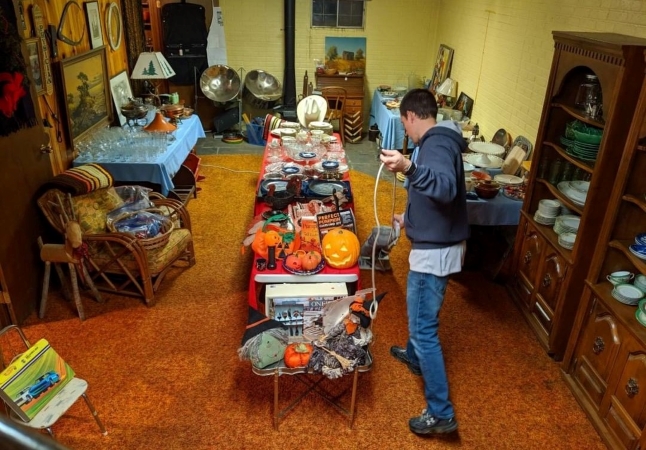If you're planning on holding an estate sale, there are a few things you need to know before you start. Estate sales can be a great way to get rid of unwanted items and make some extra money, but there are also some major mistakes you'll want to avoid.
In this blog post, we'll go over 12 major estate sale mistakes and offers suggestions on how to rectify them. Whether you're a first-time seller or a seasoned pro, you won't want to miss this essential guide to estate sales.
1. Inadequate advertising
One crucial factor in hosting an estate sale is effective promotion to reach potential buyers. Without proper advertising, the event may go unnoticed. Merely placing signs in the vicinity may only attract a limited audience. Instead, utilizing online estate sale listing services, local newspapers, and Craigslist can widen the reach and inform buyers about the specifics of the sale.
Tips for effective advertising
• Utilize online estate sale listing services, such as EstateSales.net and Craigslist
• Reach out to local papers or radio stations to advertise the event
• Create a Facebook page or post on Craigslist to update buyers of the details
2. Poorly Organized Items
When potential buyers attend an estate sale, they are often expecting items that have been sorted into categories and arranged neatly in order to make it easier for them to find what they need. If items are scattered about and not properly organized, it can be difficult for buyers to locate the item(s) that they want and may lead them away from the sale altogether.
Tips for organizing items
• Sort items by categories such as kitchenware, clothing, furniture, or books
• Utilize shelves or tables to display small items
• Take inventory of all objects prior to the sale date
3. No Set Prices
In order to make a sale, estate sellers must set prices for their items that are agreeable to both parties. If there is no price list available at the sale, it may be difficult to barter with potential customers since they have no reference point for what the item should cost. To prevent such confusion, having an established list of prices for all items prior to the sale can help facilitate smooth negotiations and sales.
Tips for setting prices
• Research comparable items online to get an idea of what the item might be worth
• Consult experts in the field if you are unfamiliar with pricing a specific item
• Consider considering offering discounts on rare or valuable items
4. Too Many Clutter Items
Clutter can often detract from more desirable and valuable items at an estate sale. Having too much clutter lying around can make it difficult for customers to find the objects that they are looking for, as well as take away from their overall experience. It is important to only display and offer items that have value or use rather than junk and unnecessary items.
Tips for minimizing clutter:
• Get rid of broken, damaged, or obsolete items prior to the sale
• Ineffective utilize shelves and tables to display items neatly
• Donate or any unwanted items
5. Getting rid of items before the sale
One of the common mistakes made during estate sales is to dispose of items before the sale. Homeowners may choose to donate, discard or sell some items prior to the sale. However, it's essential to remember that the cardinal rule of an estate sale is to refrain from giving away or throwing anything away.
Although not all possessions may hold significant value, potential buyers may be interested in items that homeowners overlook.
6. Poor staging
The presentation of your home can significantly impact the outcome of your sale. It's crucial to arrange your space in an attractive manner that appeals to potential buyers. This entails decluttering and removing non-sale items.
Additionally, you should take precautions to safeguard high-value items during staging to prevent theft. Valuables such as jewelry should be kept secure and under lock and key at all times.
Tips for effective staging
• Remove all non-sale items to create more space for buyers to browse
• Place attractive furniture and decorations around the house
• Utilize bold colors, signs, and banners to draw attention
• Keep valuable items locked away and out of sight
• Provide seating areas for customers to rest during their shopping experience.
7. Poor Quality Items/Services
The quality of the items or services offered at an estate sale can greatly influence its success or failure. Potential buyers may be put off by damaged, low-quality goods or inferior customer service. To ensure a successful event, it is important to offer only high-quality products that are in good condition. In addition, providing friendly customer service throughout the sale can help to create a pleasant experience for buyers.
Tips for providing high quality items/services
• Inspect all items before putting them up for sale
• Offer only goods that are in good condition and offer functional value
• Provide customer service staff that is knowledgeable and friendly
• Make sure all services offered are reliable, professional, and consistent
8. Unorganized Sale Process
An unorganized sale process can quickly lead to difficulty in selling items. Having an efficient system of organizing the sales process will help ensure a successful outcome. This includes having clear signage, setting up payment methods such as cash or credit cards, and utilizing customer records to track purchases. Additionally, employing helpful staff members who can assist customers during the sale will help to ensure a smooth and organized transaction.
Tips for organizing the sales process:
• Utilize clear and concise signage for customers
• Set up payment systems such as cash or credit cards
• Provide helpful staff who can assist customers in finding items and offering advice
• Keep records of customer purchases for taxation purposes.
9. Handling the sale on your own
Trying to handle an estate sale on your own can be a daunting and overwhelming task. It is advisable to hire professional help such as an estate sale company or auctioneer, who will be able to guide you through the process. Additionally, they can provide valuable advice and expertise that would benefit any successful sale.
Tips for hiring professionals:
• Research local companies or auctioneers to find the best fit
• Ask for references from previous clients
• Find out about licensing, fees, and other services provided by the professional(s)
• Have a written agreement detailing all terms of the sale prior to commencement.
10. Failure to separate market value and emotion
When preparing for an estate sale, it's important to take into consideration the market value of items. Many homeowners find themselves emotionally attached to certain possessions and may price them at a premium that does not reflect their actual worth. This can lead to fewer sales as potential buyers will be reluctant to pay over-inflated prices. It's best to have a realistic view of what items can fetch in the current market in order to maximize returns from your estate sale.
Tips for separating emotion from market value:
• Research similar items in the current market to determine a fair price
• Have independent appraisals carried out on valuable or antique items
• Take an objective view when pricing items for sale
• Utilize the services of a professional estate sale company if necessary.
11. Having a garage sale before the estate sale
Having a garage sale before an estate sale can be counterproductive. This is because people who attend garage sales are usually bargain hunters, and they may expect to find low-cost items during an estate sale.
Having a garage sale beforehand may also encourage people to leave once they’ve found what they were looking for without browsing the rest of the items available at the estate sale. It's best to let an estate sale run its course without any preliminary sales.
Tips for avoiding a garage sale:
• Do not advertise or promote any prior sales
• Allow potential buyers time to fully explore your inventory
• Ensure that there is plenty of parking space for customers
• Make sure your venue is well lit and comfortable for customers to browse in.
12. Telling the neighbors about the sale
Many homeowners make the mistake of telling their neighbors about an upcoming estate sale. This can lead to early sales with low prices, which affects the overall outcome of the sale. It is best to keep quiet until the day of the sale in order to maximize profits and ensure a successful event.
Tips for keeping a low profile:
• Keep all advertising focused on online platforms rather than local sources
• Do not inform neighbors or other acquaintances about the sale until it has started
• Make sure that staff are aware to limit information regarding discounts or special promotions prior to opening day.
Conclusion
Concluding, estate sales are a great way to find amazing deals and make the most of the items you have lying around the house. However, like with any sale situation, it’s very easy to make mistakes you might not even realize until after the fact. To get the most out of your estate sale and make sure you cover all your bases, avoid these 12 common mistakes. Make sure to take into account how much time and effort is required to host an estate sale, think through pricing carefully and determine what arrangements will be made in regards to payment methods.
Do your research when selecting an appraiser and be aware of any local legal requirements that need to be followed before hosting an estate sale. Although there's always a chance of making unintended slip-ups along the way, these tips can help ensure that everything goes smoothly so you can maximize the returns on your estate sale while saving yourself a lot of potential hassle down the road!





